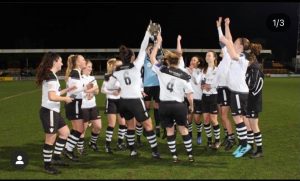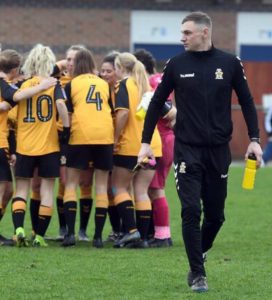Women’s Football Leaders Resigned to Their Fate Over FA Cup

At the start of November, the government announced that England would commence the second national lockdown. Following this, the Football Association quickly made the decision to suspend non-elite football until at least December 2.
Consequently, the first round of the Women’s FA Cup, originally scheduled for November 15 has been postponed. This is because all 24 clubs competing at this stage of the competition are classified as non-elite teams by the FA as they are in the fourth tier and below.
On the face of it, this decision may seem understandable. Tennis clubs and golf courses have shut, and children’s grassroots sport has been suspended.
However, in contrast to the women’s game, due to government exemption, all 40 first round ties in the men’s draw were allowed to go ahead as originally scheduled, despite 10 of these teams being categorised as non-elite.
The decision has meant sides such as Marine FC, who play in the eighth tier of English football were allowed to compete whereas Ipswich Town Women, who reached the fifth-round last season, will not be.
FA Criticism
It has resulted in a backlash against the FA over the last week with Manchester United women’s boss Casey Stoney and former England international Alex Scott slamming the decision. Both felt the suspension will only drive the already existing inequality levels between the men’s and women’s game further.
In response to these growing frustrations, Kelly Simmons, the FA’s director of the women’s game told BBC Sport that it was the correct decision to suspend the competition.
Simmons said: “If we scheduled those games, it would give those clubs an absolute headache and once we scheduled them, they would have to either play them or forfeit them.
“We still have time to play those rounds. Hopefully, the lockdown is lifted, we can get those rounds here and we’ve got plenty of time before the Super League and the Championship come in at the end of January.
“It will give those clubs a fair chance to compete on the pitch.”
From a coaching viewpoint, fourth tier side women’s side Cambridge United are trained by Ben Yeomans, who believes that the decision is understandable from a financial perspective.

“Ultimately, football from the bottom to the top of the pyramid is a money game and there’s no doubt that the men’s game brings in more money. I don’t think there is much financial return on the women’s game continuing.
“The women’s game is growing and one day it will be as lucrative as the men’s game but right now it is not.”
Momentum Stalled
Following the 2019 Women’s World Cup, where 11.7 million people in the UK tuned into watch the semi-final between England and the USA, the momentum in the sport was growing rapidly. This was sharply halted though due to the national UK lockdown in the spring.
This is because, unlike now, where thankfully, the Women’s Super League is allowed to continue, all women’s football was suspended, with every division eventually being abandoned in May.
While Yeomans acknowledged that the spring lockdown halted the game’s drive, he feels there were progressive outcomes as well.
“I think there were a lot of positives that came out of it from the spare time people had. For example, this young girl Imogen Papworth-Heidel from Cambridge, who [with the support of others such as Marcus Rashford] did 7.1 million keepy-uppies to help key workers.
“This is such a fantastic achievement and generates so much positive attention towards the women’s game.”
Initiatives, such as the one performed by Imogen, are so important in continuing to grow women’s football and subsequently help reduce the pay gap to men’s football, which is currently huge.
For instance, Manchester City Women, who – due to lockdown – won last season’s FA Cup at the start of November, earned £25,000 in prize money. £550 less than a club who only make the third-round stage in the men’s draw.
Optimism
Yeomans is optimistic though that this gap can close due to the continued rise in participation levels in recent years.
“The women’s game has to keep improving, keep getting people involved, keep getting games on television and keep making it entertaining, and then, people will want to watch it.
“That is happening, and I think there will be a day when it is as lucrative as the men’s game as it is going that way.
“The FA run a programme called Wild Cats, specifically for girl coaching. If you look at the girls’ leagues, the number of girls involved in football locally has grown seven-fold in just the last five years or so.”
This is all progressive news for the women’s game but sadly, until at least the start of December, non-elite women teams must watch on frustratingly from the side as their male counterparts continue to take to the pitch in the FA Cup.